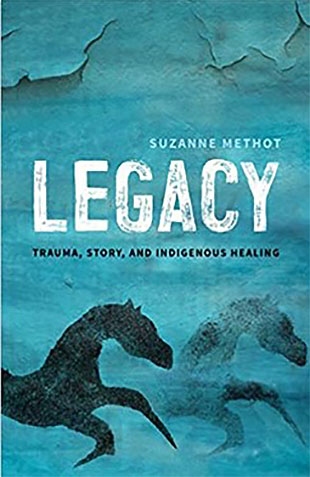This book is for anyone who cares about the losses experienced by Indigenous people in North America and about their future. The author, Suzanne Methot, is a Nehiyaw writer, educator, and community activist in Toronto, Ontario. She was raised in Alberta. She’s the co-author of a previous book, Aboriginal Beliefs, Values, and Aspirations, published in French and English by one of the largest textbook publishers in Canada and widely used in high-school social studies classes.
In Legacy, Methot shines a light on the effects of colonization on Indigenous communities, the ways of healing that are still to come, and the Indigenous ways of knowing Native people can recover. The topic is not an easy one, and the reading of this work is not always easy. We wouldn’t expect it to be. Court cases are detailed, as are ongoing abuses of Native peoples and First Nations (that’s the term most often used for Indigenous people in Canada) by the U.S. and Canadian governments. Methot also gives up-to-date information on Indigenous protests of the Dakota Access Pipeline and other ways that Indigenous people “disrupt market capitalism.” But throughout, Methot’s purpose is practical, and she often tells her own stories and experiences in order to illustrate points about trauma, stress, coping techniques, and how to heal.
She includes much Indigenous wisdom and spiritual practice. For example, in chapter 4, “The Angry Indian and a Culture of Blame,” Methot offers “Seven Sacred Teachings (Nehiyawak Version),” revealing what is already present in the Indigenous psyche — despite the damage caused by colonization and cultural genocide — to which Indigenous people may return. Due to space constraints, we can only summarize them here:
- Love: “To know love is to know creation. Connecting to creation helps you love yourself…. The Eagle represents this teaching, because it flies highest in the sky and has the gift of vision.”
- Respect: “Showing respect for others is about sharing your spirit. The Buffalo represents this teaching, because it shares every part of its being with the people … reciprocity is part of respect.”
- Courage: “Living as your own true spirit is a great challenge…. The Mother Bear represents this teaching, because Bear is gentle by nature but ferocious when defending cubs. Living through your heart and spirit is difficult.”
- Honesty: “Being honest means keeping your promises to other people, to creation, and to yourself. Long ago, the giant creature Kihci-Sabe walked among humans to remind them to be honest. Kihci-Sabe was a giant not because they were big in size, but because they demonstrated greatness by earning the trust of other people.”
- Wisdom: “To build community, people must offer their gifts and skills to the world and use them in a good way…. If Beaver does not cut trees, its teeth grow too long, becoming useless and preventing them from eating and doing the things they need to do to survive. If human being do not use their gifts and skills, they also become weak.”
- Humility: “Considering the needs of others before ourselves…. Wolf represents this teaching by living in a pack and working as a team. Humility is about living without arrogance.”
- Truth: “To know truth is to know and understand all of the Seven Sacred Teachings and remain faithful to them…. The human body reflects the truth of creation.”
